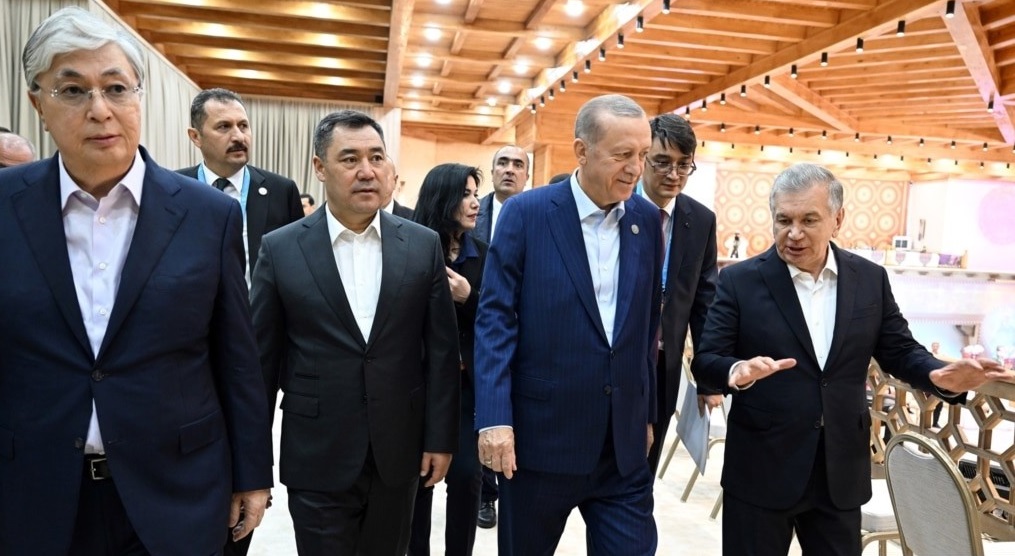The "Turanic family" and the Azeri provinces under Tehran
Azerbaijani President Ilham Aliyev continues to insist that “the Turkic World is our family”—a perspective that resonates increasingly with the rising nationalist sentiment in the majority-Azeri regions beyond the Iranian border, fuelled in part by support for Tabriz’s football team. A phenomenon that the authorities in Tehran are responding to with harsh repression.
Baku (AsiaNews) – Azerbaijani President Ilham Aliyev continues to remind audiences at every opportunity that Azerbaijanis belong to the “Turanic family,” a phrase he first used during the inauguration of his latest term in February 2024. At the time, he declared that working within the Organisation of Turkic States was a priority, calling it “the Turkic World, which is our family.” He has reiterated this conviction on numerous occasions in recent days.
Aliyev’s references are rooted particularly in the historical events of the 1940s—a “cold war” of sorts between Azerbaijan and Iran, which remains an unresolved issue in the Middle Eastern and Caucasus regions. Recently republished are the memoirs of British journalist Douglas Mac-Gregor, which were also reflected in James Aldridge’s novel The Diplomat. These works recount the story of the democratic movement in so-called “Southern Azerbaijan”, which sought freedom and justice during the Soviet era, with the aim of uniting with the Azerbaijanis living on Persian territory.
At the time, there was an ambition to reunify the two Azerbaijans—the southern part under Iran with the northern Soviet-controlled region—a subject that has remained highly sensitive ever since. On the one hand, there is the shared ethnic and linguistic heritage of the Azerbaijanis living on either side of the Aras River, which flows at the foot of Mount Ararat and forms part of the border between Turkey, Armenia, Iran, and Azerbaijan. On the other hand, the geopolitical and domestic political realities of the two countries, which straddle both Turanic and Persian spheres, remain complex.
Southern Azerbaijanis inhabit Iran’s north-western provinces, such as Ardabil and Zanjan, and others—descendants of Turanic populations separated during the Russo-Persian wars of the 19th century. Despite more than 200 years under Iranian rule, these regions have retained their language, culture, and ethnic identity, distinguishing them from the broader Persian society of the Iranian state. Today, southern Azerbaijanis struggle to reconcile their Turanic pride with loyalty to the Iranian state, calling for respect for their cultural and linguistic rights—including education in their native language and freedom of expression through their own media channels.
In recent years, a growing nationalist movement has become more visible, especially among youth and activists inspired by the ideal of the “Turanic world”, who are increasingly seeking closer ties with Azerbaijan. The Iranian government has reacted harshly to these tendencies, cracking down not only on political activity but also on overt cultural expression. From Baku, the stance is somewhat ambiguous: while officially respecting Iran’s territorial integrity, it continues to promote the rhetoric of “uniting all Azerbaijanis.” Turkey, in turn, supports the wider integration of the entire Turkic world, including within Iranian Azerbaijan.
The media plays a critical role in shaping the consciousness of southern Azerbaijanis, thanks to satellite television, the internet, and social media, which allow communication with Turkish and Azerbaijani sources that strongly promote the idea of “Turanic solidarity” as a shared vision for the future. Sport also plays a key symbolic role, particularly the football team Traktor of Tabriz—the main city in north-western Iran, with a population of nearly one and a half million. Each victory on the pitch is seen as a collective triumph of the Azeri people, whose supporters fill the stands waving increasingly explicit nationalist symbols and chanting slogans in the Azeri language.
Possible developments in this situation vary widely—from a potential unification of southern and northern Azerbaijan, to full reintegration of the southern provinces into Iranian society, albeit not without risks of uprisings and further repression. The Organisation of the Turkic World is seeking to expand its economic and political influence across the Middle East, including the Caucasus and Central Asia, positioning Azerbaijan as a crucial hub for future social and geopolitical movements in the region.







.png)










